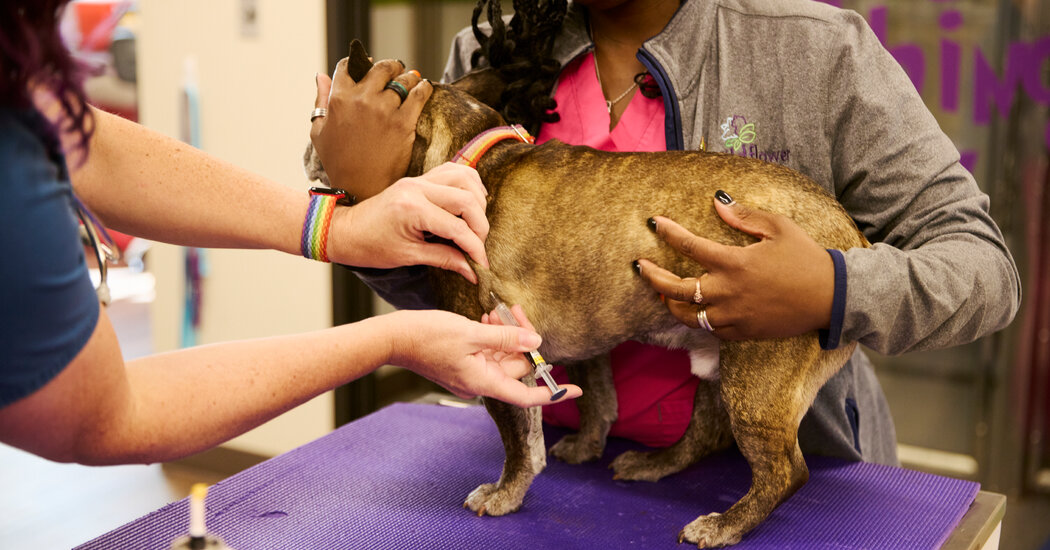Over the last few years, public health experts have expressed alarm about the spread of anti-vaccine sentiment in the United States and the fall in childhood vaccination rates. Now, veterinarians report that they are facing a parallel problem: a growing number of clients who are hesitant to vaccinate their pets.
Although all medical interventions have side effects, essential pet vaccines are widely considered to be both safe and effective, experts said. And they are an invaluable tool for giving pet owners something that they very much seem to want: more time with their animal companions.
“Vaccinations are one of the best methods we have to extend life,” said Dr. Michael Bailey, the president of the American Veterinary Medical Association.
Some serious diseases, like rabies, can also pass from pets to people; vaccinating our cats and dogs helps protect human health.
Here’s what to know about vaccinating your pet:
Who develops vaccine guidelines for pets?
In the United States, veterinarians tend to follow the vaccine guidelines developed by the American Animal Hospital Association, in partnership with the Feline Veterinary Medical Association.
The organization develops separate guidelines for cats and dogs and classifies recommended vaccines as “core” or “noncore.” Core vaccines, which are recommended for all dogs or cats, include vaccines for canine parvovirus for dogs, feline leukemia virus for kittens and rabies for both cats and dogs.
The group also endorses additional, noncore vaccines for animals that are at high risk for particular diseases. Dogs that live in places where Lyme disease is endemic may benefit from the Lyme vaccine, for instance, while those that attend doggie day care might need to be vaccinated against contagious respiratory diseases like bordetella or canine influenza.
The guidelines are reviewed and revised periodically. For example, the vaccine for leptospirosis, a bacterial disease often transmitted from rodents to dogs, was recently added to the list of core canine vaccines after it became clear that the risk of the disease was widespread.
What kinds of vaccine mandates exist for pets?
It depends on where you live and which pet-related services you use. Many states and cities require rabies vaccines for cats and dogs, although some of these laws are stricter than others.
Few other vaccines are legally mandated, although Colorado is a notable exception: A new law, which went into effect this year, requires that cats and dogs in certain group settings, including boarding kennels and grooming facilities, be vaccinated against several other common diseases.
Even outside Colorado, many pet care companies have their own vaccine policies, requiring that animals be vaccinated against a handful of highly contagious diseases before they are allowed to attend day care or stay overnight in a boarding kennel.
What are the risks of vaccination?
In one recent study examining vaccine safety in millions of dogs, researchers reported an adverse event rate of about 0.2 percent, or two in every 1,000 vaccine appointments.
The most common side effects are mild and temporary, such as pain or swelling at the injection site. More serious adverse reactions are rare but possible. These include allergic reactions and injection-site sarcomas in cats, a type of rare cancer that occurs after one in every 10,000 to 30,000 vaccinations, according to the American Veterinary Medical Association.
Still, these risks are far outweighed by the risks that come with not vaccinating pets. Vaccines are “very safe, and I’ve seen so many animals suffer and die from vaccine-preventable illnesses,” said Dr. Sara Gonzalez, a veterinarian at the University of Georgia.
Dr. Richard Ford, a veterinarian at North Carolina State University, said that although he often hears concerns about overwhelming a pet’s immune system with too many vaccines, the number of recommended doses is “not even close to doing that.”
Some vets have also heard owners repeat a concern that circulates in the human anti-vaccine movement: that vaccines cause autism. That fear is unfounded, experts agree. There is no credible evidence that links vaccines to autism in people, and autism is not a diagnosis that exists in animals.
Does an indoor-only cat need to be vaccinated? What about a dog that never goes to the dog park?
Pet owners should talk to their veterinarians about which vaccines make sense for their pets. But even animals that live cloistered lives need some vaccines.
Dogs can pick up diseases in their own yards, while even indoor-only cats may encounter rodents and bats — and the pathogens they shed.
Owners can also transport some pathogens inside on their clothes or shoes, said Dr. Jane Sykes, a veterinarian at the University of California, Davis. “And then cats just can escape,” she added. “Even when people think they’re indoor-only cats, they can end up outdoors.”
As is the case in human medicine, widespread vaccination of healthy animals also benefits the wider community, by helping to prevent outbreaks and protect more vulnerable pets, including kittens and puppies that are too young to be fully vaccinated.
Emily Anthes is a science reporter, writing primarily about animal health and science. She also covered the coronavirus pandemic.
Teddy Rosenbluth is a Times reporter covering health news, with a special focus on medical misinformation.
The post What to Know About Vaccinating Your Dog or Cat appeared first on New York Times.




